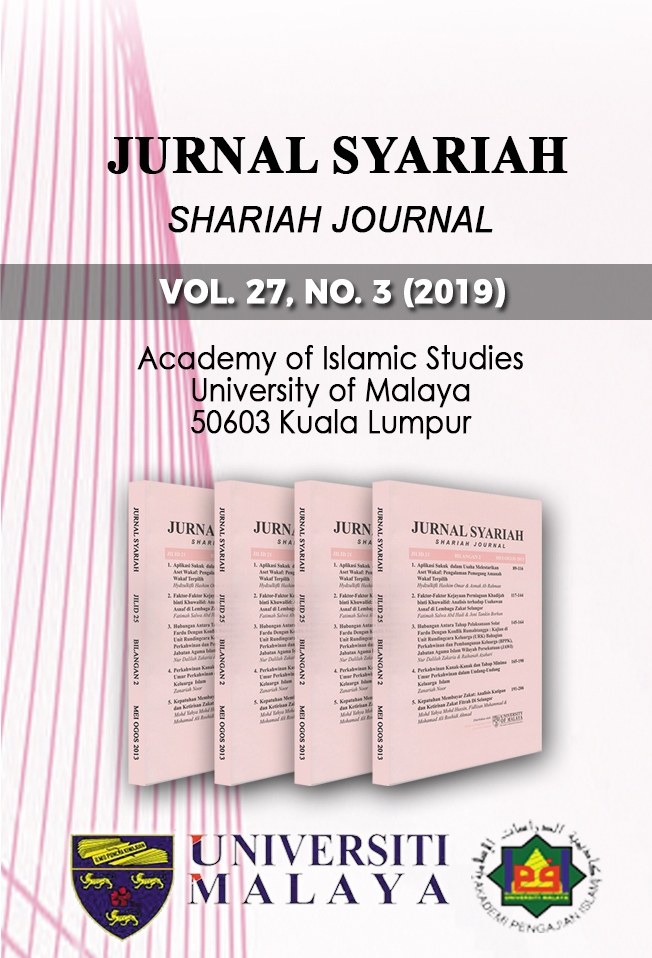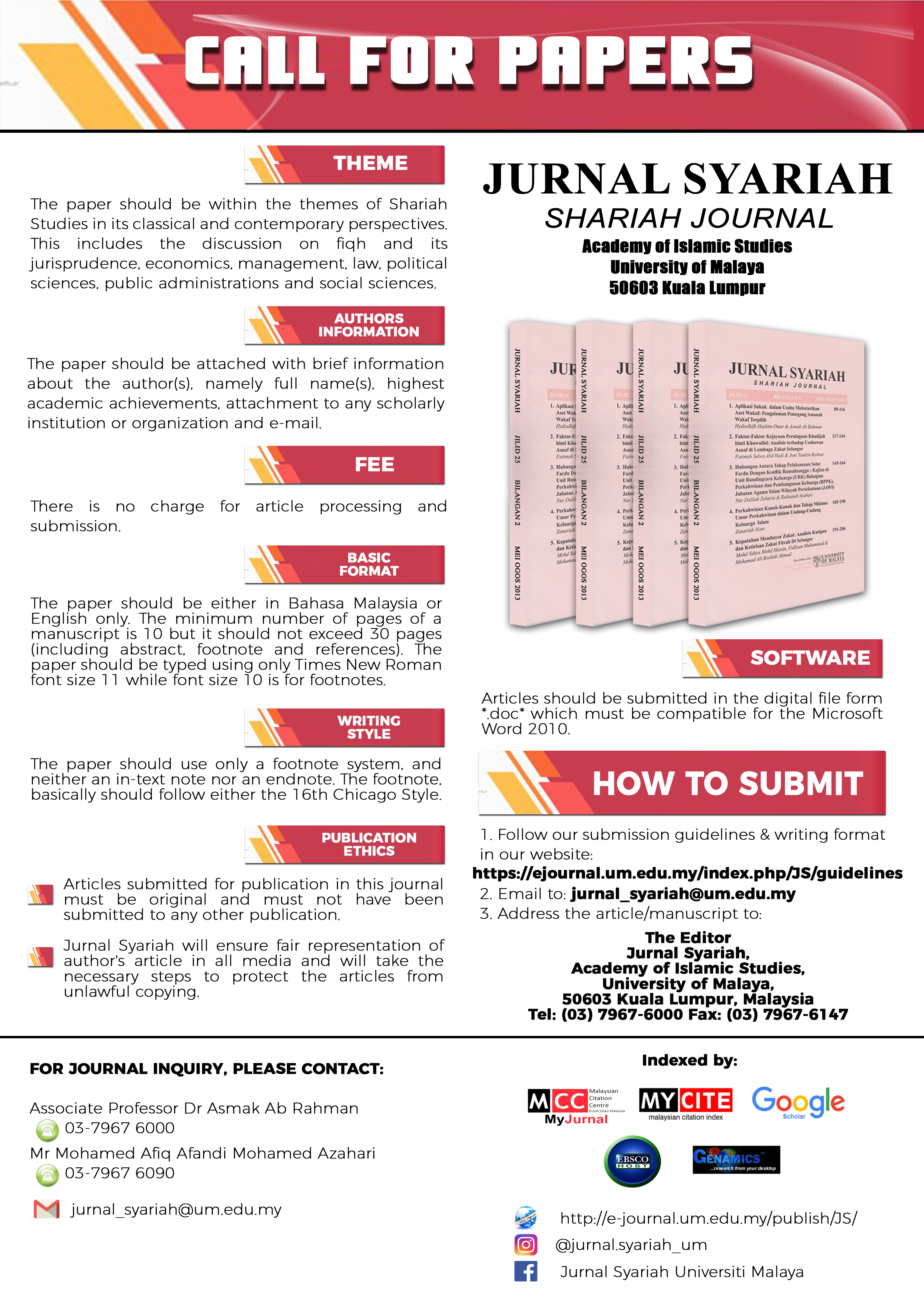THE STATE, FAMILY LAW AND WOMEN IN THE MIDDLE EASTERN AND NORTH AFRICAN REGION (MENA REGION): A COMPARATIVE SURVEY OF THE CURRENT REFORMS IN MOROCCO AND TUNISIA
DOI:
https://doi.org/10.22452/js.vol27no3.5Keywords:
Islam, women, state, family law, Morocco, Tunisia, reformsAbstract
Islam and codification of its family law in countries such as Morocco and Tunisia have taken on a somewhat of a different character depending on the specific setting in which it took place. Even though Islamic thought and in general Islamic law contains core principles observed throughout the Islamic world. Most aspects of Islamic law relating to the family originate in the divine text, while others may be found in customs of certain communities situated in different parts of the Muslim world. Some of the early reforms enacted by states such as Morocco and Tunisia have been hailed as victories for the rights of women especially where Islam is the dominant religion in those countries. A historical and comparative analysis relating to the rights of women reveal that this was not always the case. It may be argued that women rights were ancillary to the main agenda of those respective countries. Issues such as modernity, breaking the shackles of kinsman, classism and political alliances were deemed to be high on the agenda of those countries. In Morocco and Tunisia, the state, early reformers and women’s activism played and continues to play an important role or perhaps an indirect role in securing women-friendly rights in the family. In other Muslim jurisdictions, Islamic law has been left intact or very little change has occurred. The argument in those states is that Islamic law cannot be changed or re-interpreted. In this paper we investigate the reforms which have taken place in each country and why these countries have been hailed as being sensitive to the issue of women’s rights. Although, these countries have been viewed as the vanguard of women friendly rights inequality does exist as new threats to the securing of women’s rights are on the horizon.
Downloads
References
‘Convention to Consent to Marriage, Minimum Age for Marriage and Registration of Marriages,’ available at https://www.ohchr.org, accessed on 20 December 2019.
ACPF, ‘In The Best Interest of the Child: Harmonising Law on Children in Eastern and Southern Africa,’ available at http://www.africachildinfo.net, accessed on 29 May 2018.
Al Jazeera, ‘Tunisia Lifts Ban on Muslim Women Marrying Non-Muslims,’ available at http://aljazeraa.com, accessed on 14 May 2019.
Anderson, ‘Reforms in Family Law in Morocco,’ Journal of African Law (1958): 146-159.
Anderson, Law Reform in the Muslim World (London: University of London Athlone Press, 1976).
Angrist, ‘The Expression of Political Dissent in the Middle East: Turkish Democratization and Authoritarian Continuity in Tunisia,’ Comparative Studies in Society and History (1999): 730-748.
Ben Salem, ‘Tunisia,’ Women’s Rights in the Middle East and North Africa: Progress amid Resistance, ed. Sanja Kelly & Julie Breslin (Lanham and New York: Rowman & Littlefield Publishers and Freedom House, 2010), 487-516.
Bonderman, ‘Modernization and Changing Perceptions of Islamic Law,’ Harvard Law Review (1968): 1169-1185.
Booley, ‘Progressive Realisation of Muslim Family Law: The Case of Tunisia,’ PELJ (2019): 1-22.
Bordat & Kouzi, ‘The Challenge of Implementing Morocco’s New Personal Status Law,’ 2 Arab Reform Bulletin 8 (2004), available at www.ceip.org/arabreform, accessed on 20 May 2019.
Brandt & Kaplan, ‘The Tension between Women’s Rights and Religious Rights: Reservations to CEDAW by Egypt, Bangladesh and Tunisia,’ Journal of Law and Religion (1995-1996): 399-468.
Büchler & Schlatter, ‘Marriage Age in Islam and Contemporary Muslim Family Laws: A Comparative Survey,’ Electronic Journal of Islamic and Middle Eastern Law, vol. 1 (2013): 37-74.
Buskens, ‘Recent Debates on Family Law Reform in Morocco: Islamic Law as Politics in an Emerging Public Sphere,’ Islamic Law and Society (2003): 70-75.
Camelleri, ‘Modernity and the Tunisian Family in Tunisia,’ Journal of Marriage and the Family (1967): 590-595.
Campbell, ‘Morocco in Transition: Overcoming the Democratic and Human Rights Legacy of King Hassan II,’ Journal of Democracy, vol. 23/1 (2012): 38-42.
Catroux, ‘France, Tunisia and Morocco,’ International Journal: Canada’s Journal of Global Policy Analysis (1954): 282-294.
Charrad, ‘Family Law Reforms in the Arab World: Tunisia and Morocco,’ (Report for the United Nations, Department of Economic and Social Affairs (UNDESA) Division for Social Policy and Development, Expert Group Meeting, New York, 15-17 May 2012), 1-14.
Charrad, ‘Policy Shifts: State, Islam, and Gender in Tunisia, 1930s-1990s,’ Social Politics, vol. 4/2 (1997): 284-319.
Charrad, ‘State and Gender in the Maghrib,’ Middle East Report (1990): 19-20.
Charrad, ‘Tunisia at the Forefront of the Arab World: Two Waves of Gender Legislation,’ Washington & Lee Law Review (2007): 1513-1527.
Chekir, ‘Women, the Law, and the Family in Tunisia,’ Gender and Development, vol. 14/2 (1996): 43-46.
Denoeux G., ‘Countries at a Crossroads 2011: Morocco,’ available at http://freefomhouse.org., accessed on 6 June 2019.
Dewey, Kaden, Marks, Matsushima & Zhu, ‘The Impact of Social Media on Social Unrest in the Arab Spring,’ available at http://www.publicpolicystanford, accessed on 5 November 2019.
Garcés, ‘Islam, Till Death Do You Part? Rethinking Apostasy Laws Under Islamic Law and International Legal Obligations,’ Northwestern Journal of International Law (2010): 248.
Grami, ‘Gender Equality in Tunisia,’ British Journal of Middle Eastern Studies (2000): 349-361.
Hallaq, ‘Can the Shari’a Be Restored?’ in Islamic Law and the Challenges of Modernity Haddad, ed. Yvonne, Stowasser & Babara (New York: Altamira Press, 2004), 21-53.
Howland, ‘The Challenge of Religious Fundamentalism to the Liberty and Equality Rights of Women: An Analysis under the United Nations Charter,’ Columbia Journal of Transnational Law, vol. 35 (1997): 271-377.
Htun & Weldon, ‘State Power, Religion And Women’s Rights: A Comparative Analysis of Family Law,’ International Journal of Global Legal Studies (2011): 145-165.
Jansen, ‘Muslim Brides and the Ghost of the Shari’a: Have the Recent Law Reforms in Egypt, Tunisia and Morocco Improved Women’s Position in Marriage and Divorce and Can Religious Moderates Bring Reform and Make It Stick?’ Northwestern Journal of International Human Rights, vol. 5/2 (2007): 181-212.
Kamali, Principles of Islamic Jurisprudence: Introdcution (Malaysia: International Islamic University Press, 1991).
Khedher, ‘Tracing the Development of the Tunisian 1956 Code of Personal Status,’ Journal of International Women’s Studies, vol. 18/4 (2017): 1-36.
King Mohamed VI, ‘Speech at the Opening of the Parliament Fall Session,’ 10 October 2003 available at http://www.mincom.gov/ma, accessed on 19 May 2019.
Maddy-Weitzman, ‘Women, Islam and the Moroccan State: The Struggle over the Personal Status Law,’ Middle Eastern Journal, vol. 59 (2005): 396-397.
Mashhour, ‘Islamic Law and Gender Equality - Could there be a Common Ground?: A Study of Divorce and Polygamy in Sharia Law and Contemporary Legislation in Tunisia and Egypt,’ Human Rights Quarterly, vol. 27/2 (2005): 562-585.
Mayer, ‘Reform of Personal Status in North Africa: A Problem of Islamic or Mediterranean Laws?’ Middle East Journal (1995): 432- 440.
Mayer, ‘Rhetorical Strategies and Official Policies on Women’s Rights: The Merits and Drawbacks of the New World Hypocrisy,’ in Faith and Freedom, ed. Akkhami, Mahnaz (London: Tauris, 1995).
McCarthy, ‘Re-thinking Securalism in post-independence Tunisia,’ The Journal of North African Studies, vol. 19/5 (2014): 733-750.
Moosa, ‘A Comparative Study of the South African and Islamic Law of Succession and Matrimonial Property with Special Attention to the Implications for Muslim Women,’ (Master Dissertation, Faculty of Law, University of the Western Cape, Bellville, 1991).
Moosa, Unveiling the Mind: A Herstory of the Historical Evolution of the Legal Position of Women in Islam (Cape Town: Mills Litho, 2004).
Mosaiquefm, ‘Essebi Calls for the Modification of a Piece of Legislation Banning Tunisian Women from Marrying Non-Muslims,’ 13 August 2017.
Naciri, ‘The Moroccan Women’s Movement: Dynamics of Reforming Personal Status Code,’ (unpublished paper commissioned by the Deutsche Gersellschaft fur Technische Zusammenarbeit (GTZ) Office in Cairo, Egypt, 2007), 1-35.
Nadhif, ‘Tunisian President Calls for Gender Equality in Inheritance Law,’ Al-Monitor, 21 August 2017, available at http://almonitor.com, accessed on 14 November 2019.
Omri, ‘Women and Marriage in Secular Islamic Country,’ Journal of Policy Studies (2005): 147-149.
Prettitore, ‘Family Law Reform, Gender Equality, and Underage Marriage: A View from Morocco and Jordan,’ The Review of Faith & International Affairs, vol. 13/3 (2015): 32-33.
Sayed, ‘Tunisian Opposition Call for Ouster of President Essebsi,’ Egypt Today, 16 August 2017, available at www.egypttoday.com, accessed on 25 November 2019.
Sfeir, ‘The Tunisian Code of Personal Status (Majallat Al-Ahwal-Shakhsiyah),’ Middle East Journal, vol. 11/3 (1957): 309-318.
Shaham, Family and the Courts in Modern Egypt: A Study Based on Decisions by the Shari’a Courts, 1900-1955 (Leiden: Brill, 1997).
Sharafeldin, ‘Gender and Equality in Muslim Family Law,’ (Paper presented, United Nations Expert Group Meeting, Department of Economic and Social Affairs (UNDESA) Division of Social Policy and Development, “Family Policy Development: Achievements and Challenges” New York, 14-15 May 2015), 1-17.
Sonbol, ‘A Response to Muslim Countries’ Reservation Against Full Implementation of CEDAW,’ Journal of Women of the Middle East and the Islamic World, vol. 8/3 (2010): 348-367.
Stilt & Gandhavadi, ‘Strategies of Muslim Family Law Reform,’ (Faculty Working Papers, Northwestern University School of Law Scholarly Commons, 2011).
Tagari, ‘Personal Family Law Systems: A Comparative and International Human Rights Analysis,’ International Journal of Law in Context (2012): 231-252.
The National, ‘After Marriage Laws, Tunisia Now Tackles Women’s Inheritance Rights,’ available at http://www.thenational.ae, accessed on 21 November 2019.
Tucker, Women, Family and Gender in Islamic Law (Cambridge: Cambridge University Press, 2008).
UNICEF, ‘Tunisia Mena Gender Equality Profile Status of Girls and Women in the Middle East and North Africa,’ available at http://www.unicef.org/gender/files/tunisia-Gender-Equality-Profile-2011.pdf, accessed on 12 May 2018.
Ur-Rahman A, Code of Muslim Personal Law, vol. 1 (Karachi: Islamic Publishers, 1984).
Voorhoeve, ‘Judicial Discretion in Tunisian Personal Status Law,’ in Family Law in Islam: Divorce, Marriage and Women in the Muslim World (London: Taurus, 2012), 1-35.
Warren, ‘Lifting the Veil: Women and Islamic Law,’ Cordoza Journal of Law and Gender, vol. 15 (2008): 33-65.
Weideman, ‘Tahar Haddad After Bourguiba and Bin Ali: A Reformist between Seuclarists and Islamistst,’ International Journal Middle Eastern Studies, vol. 48 (2016): 47-65.
Welchman, Women and Muslim Family Laws in Arab States: A Comparative Overview of Textual Development and Advocacy (Amsterdam: Amsterdam University Press, 2007).
Western, ‘Islamic Purse Strings: The Key to the Amelioration of Women’s Legal Rights in the Middle East,’ Air Force Law Review (2008): 79-147.
Yusuf Ali A., The Holy Quran: Text, Translations and Commentary (Lahore: Ashraf Press, 1938).
Zoglin, ‘Morocco’s Family Code: Improving Equality for Women,’ Human Rights Quarterly, vol. 31/4 (2009): 964-984.
Statutes
Morocco
Constitution of Morocco 1962
Constitution of Morocco 1970
Constitution of Morocco 1972
Constitution of Morocco 1996
Constitution of Morocco 2011
Tunisia
Amendment to the Constitution of Tunisia of 1988
Amendment to the Constitution of Tunisia of 1997
Amendment to the Constitution of Tunisia of 2002
Draft Constitution of Tunisia 2012
The Tunisian Constitution of 2014
The Tunisian Constitution of 2014
South Africa
Constitution of the Republic of South Africa 1996
FOREIGN JURISDICTIONS
Morocco
Code of Personal Status 1958
Code of Personal Status 1993
Code of Personal Status 2004
Code of Personal Status of 1956
Tunisia
Code of Personal Status 1956
Code of Personal Status 1993
Code of Personal Status 2007
Downloads
Published
How to Cite
Issue
Section
License

This work is licensed under a Creative Commons Attribution-NonCommercial 4.0 International License.
COPYRIGHT: All rights reserved. Not allowed to be reproduced any part of articles and contents of this journal in any form or by any way, whether electronic, mechanical, photocopying, recording or otherwise without permission in writing from the Chief Editor, Jurnal Syariah.



















